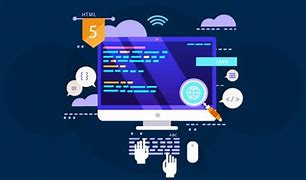Table of Contents
Introduction to Web Development
In a world increasingly reliant on the digital landscape, web developers play a vital role in creating and maintaining websites. They blend design aesthetics with coding expertise to ensure that websites are not just visually appealing but also function seamlessly across different devices and browsers.
Understanding the Role of a Web Developer
A web developer’s role encompasses designing web pages, writing code, debugging applications, and ensuring optimal user experience. They collaborate with designers, content creators, and other developers to bring a website to life.
Necessary Skills for Aspiring Web Developers
To thrive as a web developer, certain skills are crucial. These include proficiency in programming languages, problem-solving abilities, attention to detail, and creativity. Effective communication skills are also essential, as developers often need to convey complex technical concepts to non-technical team members.
Educational Pathways
High School Education
Many successful web developers begin their journey in high school by learning the basics of programming languages like Python and Java. These foundational skills provide a strong base for further learning.
Pursuing a Relevant Degree
A bachelor’s degree in computer science, software engineering, or a related field is a traditional pathway to becoming a web developer. It provides in-depth knowledge and a structured curriculum to build a solid foundation.
Online Coding Bootcamps
Coding bootcamps offer intensive and focused training, often in a shorter time frame than traditional degrees. They are an excellent option for individuals looking to switch careers or upskill quickly.
Self-Study and Online Resources
The internet is a treasure trove of resources for aspiring web developers. Online tutorials, courses, and coding platforms allow individuals to learn at their own pace and convenience.
Mastering Programming Languages
HTML and CSS
The fundamental components of web development are HTML and CSS. HTML structures content, while CSS ensures its visual presentation.
JavaScript
JavaScript adds interactivity to websites. It allows developers to create dynamic and responsive features, enhancing user engagement.
Backend Languages (Python, Ruby, PHP)
Backend languages power the behind-the-scenes functionality of websites. Python, Ruby, and PHP are popular choices for server-side development.
Frontend and Backend Development
Frontend development focuses on the user interface and user experience, while backend development handles server-side operations, databases, and more. Understanding both aspects is crucial for becoming a well-rounded web developer.
Getting Hands-On Experience
Practical experience is invaluable in the web development journey.
Personal Projects
Building personal projects, such as personal websites or small applications, showcases your skills and creativity to potential employers.
Internships and Freelancing
Internships and freelance projects provide real-world experience, exposure to client requirements, and the opportunity to collaborate with experienced professionals.
Open Source Contributions
Contributing to open source projects not only demonstrates your coding abilities but also allows you to collaborate with developers worldwide.
Building a Strong Portfolio
A well-organized portfolio showcases your best work, highlighting your capabilities and areas of expertise.
Creating an Impressive Resume
Craft a tailored resume that emphasizes relevant skills, experiences, and projects.
Job Portals and Platforms
Utilize job portals like LinkedIn, Naukri, and Indeed to discover job opportunities.
Networking Events and Meetups
Attend tech events, seminars, and meetups to connect with industry professionals.
Utilizing Social Media
Platforms like Twitter and GitHub are excellent for networking and showcasing your work.
Acing the Interview
Prepare for technical interviews by practicing coding challenges and reviewing key concepts.
Continuous Learning and Skill Enhancement
Web development is an ever-evolving field. Keep learning new things and remain curious.
Staying Updated with Industry Trends
Subscribe to blogs, podcasts, and newsletters to stay informed about the latest trends and advancements.
Web Development Career Paths
Frontend Developer
Front-end developers focus on designing logical and attractive user interfaces.
Backend Developer
Backend developers ensure smooth server-side operations and database management.
Full-Stack Developer
Developers who are full-stack are knowledgeable in both frontend and backend work.
UI/UX Developer
UI/UX developers specialize in crafting seamless user experiences and interfaces.
Conclusion
Embarking on a journey to become a web developer in India requires dedication, continuous learning, and a passion for innovation. By mastering the necessary skills, building a strong portfolio, and navigating the job market strategically, you can transform your aspirations into a rewarding career.
FAQs
Q1: Does becoming a web developer require a degree?
A: While a degree can provide a solid foundation, self-study and practical experience are equally valuable in this field.
Q2: What programming languages should I learn?
A: Start with HTML, CSS, and JavaScript. Backend languages like Python and PHP are also valuable.
Q3: How can I build a portfolio without professional experience?
A: Create personal projects and contribute to open source projects to showcase your skills.
Q4: What is the average salary of a web developer in India?
A: Web developer salaries vary based on experience and location, but the industry offers competitive pay.
Q5: How can I stay updated with the latest industry trends?
A: Follow blogs, podcasts, and online communities to stay informed about the ever-evolving world of web development.




